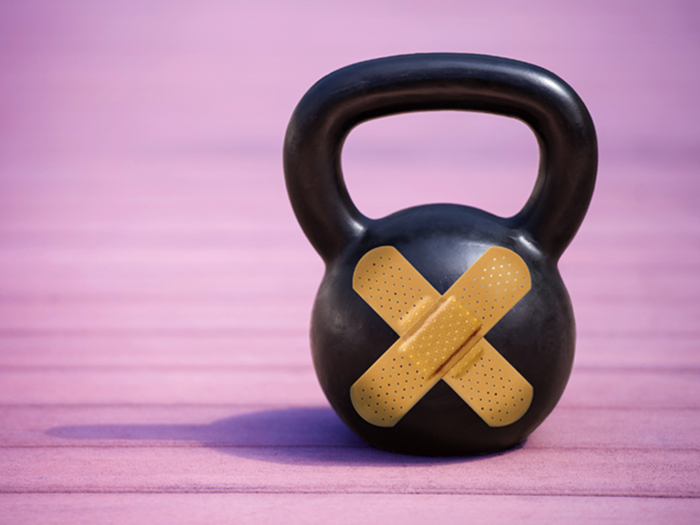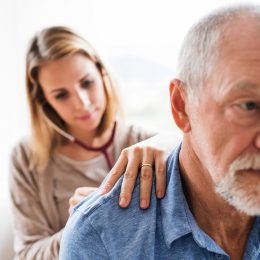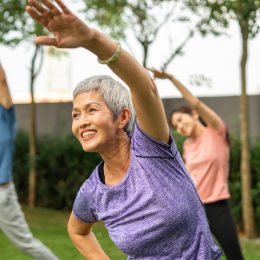Am I Normal? 6 Odd Things That Can Happen During Exercise
Exercise is strong medicine—often with some strange side effects.

From more energy to better pain management to stronger bones, there are numerous benefits to regular exercise. But when you’re just getting started with a cardio or strength training routine, you might also notice some less-than-ideal things happening to your body, ranging from the painful to downright embarrassing. Here are six strange but completely normal things that can happen during exercise—and when it’s worth talking to your doctor.
1. Sudden Muscle Cramps
If you’re dehydrated, new to exercise, or in the middle of a strenuous workout, you might experience painful muscle cramping, especially in your legs. This sudden tightening, also known as a charley horse, is usually caused by dehydration or overuse, says Kathy Bonacini, D.P.T., a physical therapist at the UCSF Outpatient Faculty Practice in Mission Bay, California.
Cramping can also be caused by mineral imbalances of calcium, magnesium, and potassium; circulation problems; and certain medications, she says. In other words, it’s very common. “Despite the possibility of experiencing a muscle cramp,” Bonacini says, “my advice for the 60-plus crowd is to exercise, exercise, exercise for a better quality of life.”
Stretching and drinking plenty of water before, during, and after exercise may help ward off cramps. If you continue to have them, check with your doctor to make sure there’s no underlying issue.
2. Bladder Leakage
While embarrassing, having an accident during exercise is totally normal, especially if you’re running, dancing, or doing any other sort of bouncy movement.
“As we age, our pelvic floor muscles weaken, especially in women who have had children,” says Jennifer Stagg, N.D., founder and medical director of Whole Health Wellness Center in Avon, Connecticut. “This results in a condition called stress incontinence, and when you do more strenuous exercise, you could end up peeing a little in your pants.”
To avoid this, always use the bathroom right before your workout—even if you don’t feel like you need to go. If you still have an issue, talk to your doctor about other treatment options.
3. Itchy Skin
Exercise gets your blood flowing, which causes your blood vessels to expand. In some people, this stimulates nearby nerves and can cause a mild to intense itch that no amount of scratching seems to help, Stagg says. Some people also experience this at night after they get under warm covers.
“Unfortunately, there’s not much you can do about this,” Stagg says. Your best bet: Remind yourself that this is nothing to worry about, and try to think about something else until the itch subsides.
The exception: If you have diabetes or a skin condition, you may be more likely to itch in general. Ask your doctor if there are ways to make yourself more comfortable.
4. Lightheadedness
After you finish your workout, your heart rate returns to normal but your blood vessels are still dilated, which reduces blood pressure, Stagg explains. This drop can make you feel lightheaded, and people with a lower resting blood pressure may experience intense dizziness as a result. While the dizzy feeling is common, it’s not always harmless.
“If you’re taking blood pressure medication or having more-than-mild symptoms, discuss this with your doctor,” Stagg says. “Falls from getting lightheaded can be very serious, with higher rates of fracture and injuries as we age.”
Subscribe to our newsletter
It's quick and easy. You could be one of the 13 million people who are eligible.
Already a member? Click to discover our 15,000+ participating locations.
Follow Us
5. Runny Nose
A gushing nose during or after your workout probably isn’t a sign you picked up a bug at the gym. It’s actually a normal physiologic response related to changes in blood flow called “exercised-induced rhinitis,” Stagg says. If this occasionally happens to you, pack some tissues and enjoy your workout.
For people with seasonal allergies, fresh air may be to blame. “Exercising outdoors exposes us to pollen and other allergens that can set off a cascade of symptoms,” Stagg says. If this sounds like you, talk with your primary care doctor or an allergy specialist to create a plan for exercising.
6. Upset Stomach
While not as common as the other things on this list, exercise-induced diarrhea can become an issue as we age, Stagg says. It usually occurs after more intense exercise, which means you’re more likely to have to run to the nearest bathroom after a jog than a stroll around the block.
“As we age, our sphincters and digestive system can become weaker and make us more susceptible,” she says.
To lower your chances of a mid-workout panic, avoid drinking warm liquids within one hour before exercise. Consuming coffee, tea, or even warm oatmeal can jumpstart your body’s need to boldly go where you haven’t gone before.





